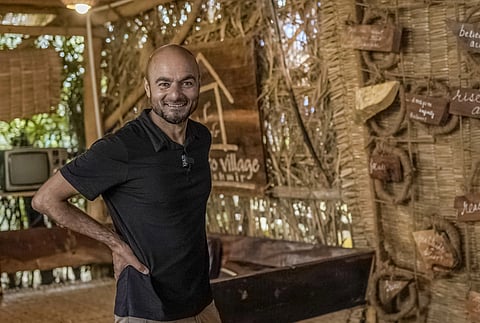Fayaz Ahmad Dar On Setting Up Kashmir's First Eco Village
From empowering local communities to embodying the essence of eco-consciousness, Sagg Eco Village is a testament to Fayaz Ahmad Dar's commitment to intertwining tradition with innovation. In an exclusive interview with Outlook Traveller, Dar shares his inspiring journey from idea to reality, highlighting the village's profound impact on the local community and how he champions sustainability while honouring Kashmir's unique traditions.
How did the idea of creating an eco-village come about?
I was born and raised in a village in northern Kashmir and belong to a modest peasantry background. However, my educational journey led me away from Kashmir. Despite this, I felt a strong pull to return to my homeland, eventually coming back in 2010.
Upon returning, my focus turned to the young people of Kashmir. I aimed to understand their aspirations and how they envisioned realising them. I initiated a participatory action research project and also established my non-profit, Mul, which translates to "roots" in Kashmiri. Around 2012-2013, I conducted a needs assessment project involving interactive research that evolved into a follow-up research endeavour centred on envisioning a desired future and our roles in creating it.
Throughout the process, we realised that young individuals aspired to initiate positive change and contribute to ecological well-being. However, the limited array of career options often hindered their proactive efforts. In Kashmir's complex context, security overshadowed other pursuits. The practical solution I envisioned culminated in the idea of a value-based entrepreneurial experiment—an eco-village. "Sagg" signifies nurturing or watering in Kashmiri, symbolising the act of tending to roots. This venture was birthed to provide a real-life platform for the initiatives young individuals aspired to, creating a tangible avenue to bring their dreams to fruition.
What challenges did you overcome while setting up Sagg Eco Village?
There have been many challenges that I have overcome throughout my journey. In the context of a difficult environment where trust is scarce, collaboration, idea dissemination, and persuasion become difficult. Convincing people who have undergone their share of hardships is no small feat. Moreover, the initial state of the land—barren, devoid of infrastructure, dominated by thorns and rocks—stood in stark contrast to the vision of an eco-village.
However, my approach has been to view challenges as opportunities. This mindset has empowered me to tackle problems with the aim of making improvements and exchanging value.
How do you think the local communities benefit from initiatives such as creating an eco village?
Initially, when I arrived at this barren land, the locals expressed scepticism due to concerns about wildlife. Despite this, I persisted, and as progress unfolded, their perception shifted from disbelief to amazement. Gradually, they witnessed the transformation and began recognising the project's potential.
The local population is an integral part of our efforts. We prioritise sourcing materials locally, with approximately 94 per cent of our materials procured within the area. This approach significantly contributes to the community's well-being. Our entire team, from masons to carpenters, consists of local individuals.
Notably, a portion of the educational programmes is reserved for local students, with 20-25 per cent offered scholarships. We collaborate with other organisations through our non-profit to design and deliver training programs. An example is our initiative to train 20 young women in establishing small-scale ventures in handicrafts and farming.
How do you equip the local youth to become eco-conscious entrepreneurs?
For those seeking more in-depth experience, we've developed programmes centred around ecological entrepreneurship and fostering an entrepreneurial mindset. Ecological entrepreneurship involves integrating natural, cultural, human, and technological resources to create businesses that inherently enhance life quality and ecology.
Moreover, we conduct month-long courses and establish an online community to facilitate long-term engagement from anywhere. We've also launched the Village Academy to provide coaching and training. Furthermore, we offer consultancy services for those interested in replicating this concept.
How has Sagg Eco Village preserved the local traditions and culture?
If the goal is to conserve culture, then its practice is essential. Culture isn't static; it's a living entity shaped by countless years of real-life experiences.
We endeavour to blend our cultural heritage with modern knowledge and technology. The transition from tradition to modernity has often occurred without fully comprehending the associated pros and cons. Our approach, in contrast, is one of integration. While treasuring tradition, we also critically assess new aspects, exploring how they can harmoniously coexist within our culture.
For instance, the merits of mud-plastered houses in Kashmir lie in their natural temperature regulation, rendering air conditioning largely unnecessary. Unfortunately, many modern constructions demand air conditioning, even though traditional alternatives suffice.
How can tourists embrace a more sustainable way of travelling that also positively affects the ecology and the local community?
Yes, the issue of over-tourism is undeniably real, and its consequences are evident. The tourists or travellers who lead to significant plastic waste and other pollutants, thereby contributing to pollution, are particularly concerning. Moreover, they often engage with services, products, and spaces, prioritising convenience over environmental consciousness.
To address this, we've positioned ourselves in a distinctive setting, away from the traditional tourist hotspots. This strategic move aims to disperse the influx of visitors, preventing undue stress on particular locations.
Additionally, travellers should adopt a mindful approach to their visits, extending beyond the commonly designated "peak season." Nature's beauty and value unfold year-round, and this diversity should be embraced.
We've implemented measures to manage visitor numbers in our village to address this predicament. Presently, we've set an upper limit of 50 visitors per day. This regulation allows us to balance welcoming guests and preventing overcrowding.


